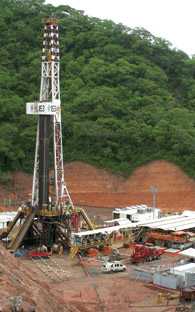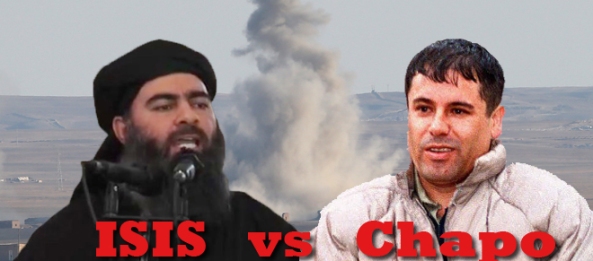The Clean Development Mechanism of the Kyoto Protocol eventually gestated a perverse incentive; companies find it cheaper to offset their greenhouse gas reducing
Stefano Valentino * / Tierramérica Special

Major U.S. corporations such as Dow Chemical, ConocoPhillips, Chevron and Cabot Corporation, have used a questionable business practice of carbon credits to offset their climate pollution’s role in Europe, according to the following investigation.
Dow was the main buyer. The company has factories producing plastics and chemicals that emit carbon dioxide in Germany, Belgium, Spain, Holland and Poland. Meetings take place 21 among the top 100 European buyers of certified carbon emission reductions (CERs) arising from the 19 projects of dubious legitimacy.
The power generation settled down in the European Union (EU), some of them subsidiaries of U.S. companies are forced to cut greenhouse-gas pollution that cause global warming, by adopting cleaner technologies or offsetting emissions through the purchase of CRE.
Companies find it cheaper to offset their emissions to reduce them really. And the weaknesses of European standards, they can.
The CRE are fought under the Clean Development Mechanism (CDM) of Kyoto Protocol, the only international treaty that requires signatory industrial nations to reduce their greenhouse emissions.
CRE each equal to one ton of carbon dioxide that was thrown into the atmosphere. And for the responsible delivery of an approved project, after certifying that the reduction actually took place. Then you can generate tradable instruments, subject to the laws of supply and demand.
The CDM was established by the United Nations Organization for industrial countries subsidize climate change mitigation in developing nations. But ended up creating a perverse incentive to maximize profits used a handful of manufacturing of industrial gases, mostly located in India and China, which obtained those 19 projects.
China Jiangsu Meilan Chemical’s and Navin Fluorine International Hindu, among others, pledged to capture and destroy HFC-23, a residue from the production of the refrigerant HCFC-22 (hydro chlorofluorocarbon), banned in the European Union and the United States because depletes the ozone layer.
HCFC-22 is also a super greenhouse gas, 810 thousand times more potent than carbon dioxide, and HFC-23 11 000 it is 700 times more.
But Indian and Chinese companies ended up producing more of that gas and getting a lot more CRE than necessary, according to research panel of experts in CDM methodology.
In June 2010, non-governmental environmental organizations CDM Watch, based in Bonn, and Environmental Investigation Agency (EIA, for its acronym in English), based in London, discovered this blatant misuse of the CDM and provided evidence.
“Certificates of HFC-23 do not represent real reductions in greenhouse gases,” said Diego Martinez-Schuett, CDM Watch. “And buyers used these false reductions as permits to pollute more in Europe.”
The 19 projects of industrial gas destruction approved by the CDM accumulated nearly 500 million loans worth three thousand 300 million dollars. Nearly 90 percent of them flooded the EU, and constitute more than half of the total block offsets.
Between 2009 and 2010, U.S. corporations bought almost one million credits for HFC-23 at an average price of $ 16 per unit. Since then “spent” at least $ 16 million in alleged emission reductions.
The same behavior continued their European competitors such as BP and British Shell, RWE of Germany, Norway’s Statoil, the Spanish-Italian group Enel and France’s EDF.
The ten most popular transatlantic companies listed on the main global stock market joined Euronext NYSE-$ 254 million on these false claims, excluding 2011 data not yet published.
In June last year, European regulators decided to ban these CRE, but the measure will only be effective from May 2013. “The EU came under pressure from investors to postpone the ban, initially scheduled for January 1, 2013,” said activist Natasha Hurley, of the EIA.
Meanwhile, the door remains open for Dow, Shell and other polluting companies to acquire a further 53 million false CRE.
U.S. firms say they were unaware of the unlawful nature of HFC-23 credits before the discarded EU.
What matters now is “what will make buyers of these CERs to legitimize their compensation measures,” asked Rob Elsworth, of Sandbag, a nongovernmental organization that investigates the integrity of emissions trading and added up the figures used in this article to show the involvement of businesses.
The question was posed to several of these companies
“In recent years, we use these CERs to meet,” said the head of communications at Dow’s subsidiary in Belgium, Holland and Luxembourg, Drea Berghorst. “We will continue to meet the standards, which means that we will stop using the CRE industrial gas in April 2013,” he said.
Chevron and Cabot responded similarly, without ruling out the option to buy more credits from HFC-23 while in circulation.
“Chevron respected and will respect all aspects required by European standards for emissions trading,” said Sean Comey, media consultant in the company’s world headquarters in California. The corporation took advantage of these credits to offset emissions from offshore oil which operates in Britain.
“We work with a prestigious financial agent, JP Morgan, to buy those CRE and ordered everyone to be certified and validated,” said Vanessa Apicerno, a specialist in media relations of Cabot’s headquarters in Boston.
The corporation used the CRE to offset pollution generated by their articles of carbon black and thermoplastic in France and Italy. ConocoPhillips, which used the credit for its refineries in Britain and Norway, declined to comment.
Now more than ever, companies have good reason to use shareholders’ money in investments that exacerbate climate change.
In fact, brokers are trying to sell the race remnants of these CRE before they become waste in 2013, and push the prices down. In February, prices were only six dollars a ton, after reaching a peak of $ 33.
“Companies are looking for the cheapest way to meet the standards. Market participants are free to have their ethical considerations about how to deal with climate change, but the system is governed by the economy, “said Richard Chatterton, analyst, Bloomberg New Energy Finance.
Statistics show that the price difference is more important than the quality of the certificate.
“The common CRE (such as HFC-23) still constitute over 95 percent of the volumes traded in the future,” said Sara Ståhl, director of global markets for Green Exchange, a market operator dedicated to environmental derivatives. “And they are just 46 cents cheaper than our future plus CRE (non HFC-23).”
Considering the additional amount of CRE inflated supported by the EU until next year, we can estimate that savings to business will be about $ 24 million. The real question is whether these coins worth saving for corporations to save the real world from overheating.
* Published in accordance with Freereporter http://www.freereporter.info. This research was supported by the Fund for Investigative Journalism and the Society of Environmental Journalists


